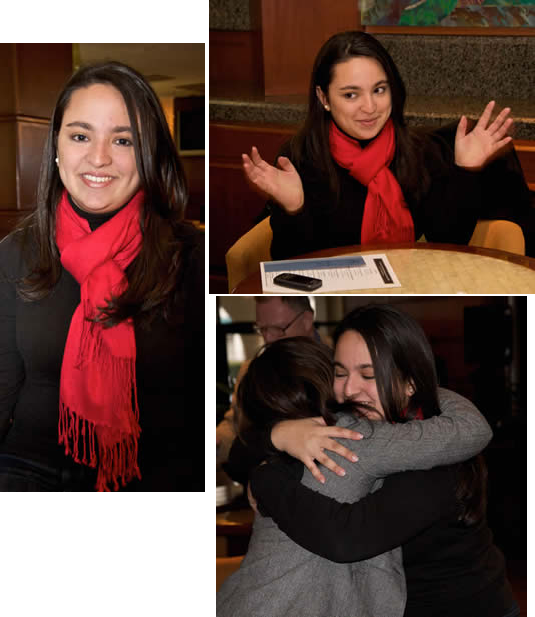For Connecticut College Student, a Long Journey From Colombia to the Inauguration
FELFLE
New London Day
Katie Koch
Boston University Washington News Service
Jan. 18, 2009
WASHINGTON – It took Alexandra Felfle nearly two days to travel from her hometown of Barranquilla, Colombia, to the Hilton Washington. Still, she arrived at the hotel Saturday smiling and poised, ready to witness the inauguration of Barack Obama.
Add to that her flawless English, and it was easy to forget how far the Connecticut College junior had come for this week’s University Presidential Inaugural Conference. That is, until she saw an old friend from her first trip to the States, and the two young women erupted in laughter and frenzied Spanish, her native language.
It was a long-awaited reunion for Felfle, who first visited Washington in 2005 as the only foreign student to receive a scholarship to the Global Young Leaders Conference. Early last year that program’s sponsor, the Congressional Youth Leadership Council, invited Felfle to the special 2009 university inauguration conference. After months of fundraising, she’s finally in town for Tuesday’s festivities.
Of the 5,000 college students attending this week’s conference, only 495 are international, according to program spokesperson Carmen McClaskey. Nearly all the participants are alumni of Congressional Youth Leadership Council programs.
As part of the conference, Felfle will hear speakers such as Colin Powell and Al Gore, watch the inauguration from the Mall and attend a black-tie gala for the program’s students at the National Air and Space Museum downtown. She also will get the chance to discuss politics and ideas with like-minded young people from around the world.
The logistics of Felfle’s trip weren’t easy. Her parents paid for her plane ticket to Washington from Barranquilla, where she spent her winter break, but she had to come up with the conference fees herself.
“I thought, either I need to get a scholarship, I need to work, or I need to find a way to do this,” she recalled.
As it turned out, Connecticut College stepped in to help Felfle, the first international student at the college to serve as a class president.
“The day she got the letter, she talked to me and we kind of set out a game plan for her and who she should approach,” Cheryl Banker, Felfle’s career counselor at Connecticut College, said. “She wrote letters, did all the solicitation. She went after it.”
Over the next several months, Felfle raised nearly $3,000 from 11 different departments and administrators at the university, including college President Leo I. Higdon Jr.
“Her accomplishments enrich us all, and the support she received from so many people and departments across campus is a strong reflection of the pride we have in her,” Higdon said in a statement to The Day.
Even before her door-to-door campaign, Felfle had become a familiar face to the deans and counselors at the school as a “very enthusiastic freshman,” according to Mary Devins, associate director of the college’s Toor Cummings Center for International Studies and the Liberal Arts.
“I said to her, ‘You go for it, girlfriend, I’ll give you some money,’” Devins said.
In exchange for the financial boost, Felfle will give a presentation on her inauguration experience at Connecticut College on Feb. 13. She also hopes to gain extra perspective on America’s economic relationship with Colombia, which will be the focus of her senior thesis in economics and international relations.
Although she couldn’t vote in November’s elections, Felfle closely followed both candidates’ positions on foreign aid and trade. A country long plagued by drug trafficking and guerrilla warfare, Colombia is one of the top ten recipients of American foreign aid. It also relies on free trade to keep its economy afloat, Felfle said.
While taking classes at Georgetown University’s Semester in Washington Program in the fall, she became an advocate of free trade between her native and adopted countries. She said she is curious to see what policies Barack Obama will pursue and if he will address Colombia in his speech on Tuesday.
“Globalization is a boat you want to jump on,” she said. “It’s not positive right away, and it will take some time…but I think Obama changed his mind [about a U.S.–Colombia trade agreement] because he saw what good it could do for the country.”
Armando Bengochea, dean of the college community and one of the donors to Felfle’s trip, said her studied attitude toward international cooperation is evident in her work on campus.
“She strikes me as a true believer in globalism as distinct from globalization, who’s interested in solidarity between people and governments,” Bengochea said. “She’s someone who tries to build bridges.”
Like most of the millions coming to Washington this week, Felfle said she feels a personal connection to the new president that will make her trip even more memorable.
“In a weird way I relate to him, especially to his dad coming to the U.S. to go to school,” Felfle said. “He’s a fighter. He got everything in life based on his intelligence, and I admire that.”
-30-


